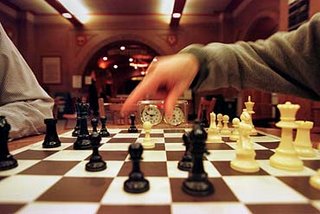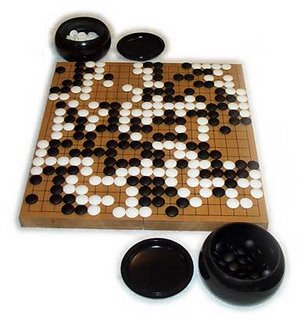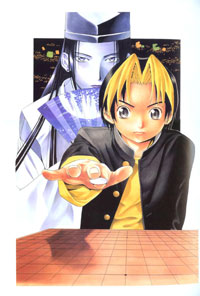As humans, we have some games which combine athletic activities with rationally-based rules and point systems. Thus, while our sports may at a certain level share a basic purpose of promoting teamwork and staying in shape with the games a pride of lions play, our games contain a rational, structured element which is unique to human activities.
Other games, however, are strictly rational games in that they employ some combination of skill and chance, but involve no real physical activity. Among the games of chance (or heavily involving change), some card games go back four hundred years or more. Backgammon and dice games such as craps go back millennia. However other games are strictly games of skill and strategy, and of these there are two particular stand-outs in age and depth of strategy: Chess and Go.
 Chess is by far the most familiar to those in Western countries. Originating in India around the 6th century AD, there are clearly recognizable chess variants throughout the Middle East and Far East, including the Japanese game of Shogi. Chess is essentially a fight to annihilate (or at least decapitate) the enemy, and because the pieces can only move in specific ways, there's usually a fairly limited number of reasonable move options at any given point in the game. This both makes the opening absolutely key to the course of the game -- with top chess players memorizing numerous standard opening sequences and the proper counters and variations to them. This limited number of good moves at any given point is one of the things that makes computers so good at chess: when it comes to calculating the likely results of making every possible move, computers usually far exceed human ability.
Chess is by far the most familiar to those in Western countries. Originating in India around the 6th century AD, there are clearly recognizable chess variants throughout the Middle East and Far East, including the Japanese game of Shogi. Chess is essentially a fight to annihilate (or at least decapitate) the enemy, and because the pieces can only move in specific ways, there's usually a fairly limited number of reasonable move options at any given point in the game. This both makes the opening absolutely key to the course of the game -- with top chess players memorizing numerous standard opening sequences and the proper counters and variations to them. This limited number of good moves at any given point is one of the things that makes computers so good at chess: when it comes to calculating the likely results of making every possible move, computers usually far exceed human ability. Go has only become known of in the West in the last hundred years or so, and is still far less well known than chess, however it's history stretches back nearly four thousand years to ancient China. The game is widely popular in China, Korea and Japan, and has a certain (though must less well known) following in America and Europe.
Go has only become known of in the West in the last hundred years or so, and is still far less well known than chess, however it's history stretches back nearly four thousand years to ancient China. The game is widely popular in China, Korea and Japan, and has a certain (though must less well known) following in America and Europe.Go's rules are significantly simpler than chess. It is played on a 19x19 board between players playing black and white stones. Stones are played at the intersections of the lines instead on within the squares. Once the stones are played, they remain on the board without being moved, unless the are captured and removed from the board.
Go is essentially a territory-taking game. The goal is to control the majority of the board when the game play ends. Territory is defined as the number of empty intersections which one controls.
The thing that leads to go's incredible strategic complexity is the concept of "life" around which the entire came centers. A stone or group is "alive" if it has adjacent to it or within it "liberties": empty intersections. Any stone or group with no liberties is "dead" and is removed from the board. A group becomes un-kill-able if it contains sufficient internal liberties that you cannot kill it by surrounding it and then filling it it's liberties, because any enemy stones inside will run out of liberties and be killed before the group is. (The black group in the lower left corner of the board above is alive and cannot be killed.)
If you want to learn more about go while
 generally having a blast, the anime Hikaru No Go (about a 6th grade boy who become acquainted with the ghost of a millenia old go master) is a great way to do it. The series is exciting even for those with no previous acquaintance with the game (read MrsDarwin) and actually teaches a lot of very good go along the way. (Several professional go players consulted on the original manga and the series based on it.)
generally having a blast, the anime Hikaru No Go (about a 6th grade boy who become acquainted with the ghost of a millenia old go master) is a great way to do it. The series is exciting even for those with no previous acquaintance with the game (read MrsDarwin) and actually teaches a lot of very good go along the way. (Several professional go players consulted on the original manga and the series based on it.)Unlike chess, go playing computer programs have only been able to achieve moderate proficiency. No program has beaten even a lowest rank professional player. (Though they can certainly beat me.) The main reason for this is that although the rules themselves are very simple, the number of moves that can be played at any given point is huge, given the 19x19 board. And strategic dominance of the board is less simple to calculate as a goal than checkmating a single piece. Which in turn is one of the fascinating things about the game.






13 comments:
That sounds very interesting. I feel that my intellectual pretensions are, ultimately, a sham, for I do not know how to play chess. Maybe I could start with Go and work up in complexity of things you have to remember.
I don't know how to play chess that well, but as for me, Go is my favorite board game of all time. I've never heard it called that though. I've always heard it called Othello or Reversi.
Hate to break it to you, ferret, but in your drunkenness you have confused your games. While there are definitely some similarities between Go and Othello, there're definately different games. (In Othello you flip pieces, while in Go you capture them; what it takes to capture a group is different; the board in Go is much bigger, etc.) However if you like Othello, I imagine you'd definately like Go.
Check out the manga or anima of Hikaru. You'd probably like that too.
I heard that Einstein thought Chess was a game for pansies. In his opinion the real mathematician's game was checkers (or draughts to use its 'proper' name).
I bet he would have loved Go, too...
(...although maybe he was just rationalising an inability to win).
Doesn't look anywhere near as fun as Axis & Allies. ;)
Are you really recommending Anime? Isn't it the spawn of the devil? Ugly art leads one away from God, I have repeated ad nauseum to my offspring of seven homeschooled souls, even if teaching interesting game rules. (DH remembers Go from college days, St John's college that is).
One always hesitates to ask if someone is joking, since if the person isn't one is likely to thus give offense...
I would agree that ugly art corrupts the senses, and if sufficiently ugly, the soul as well. However, I would disagree that anime is necessarily ugly art. Certainly some is. There's an incredible amount of animation that comes out of Japan, and much of it is or low artistic or story quality.
However, I would also argue that probably the _only_ truly beautiful animation being produced these days is anime.
As for Hikaru No Go, I'd say the artistic quality is moderately high (about on a par with series like Samuri Champloo and Fullmetal Alchemist) and the story is certainly very well done.
Rick,
It's been a while, but I played my share of Axis & Allies games. Seems like they started the war late enough, though, as to make it very, very difficult for the game to end with anything but an allied victory. Which historically is a good thing, but made the play a little frustrating at times.
Maybe so, D, though I remember one game in particular where the Axis beat the Allies (I was USA). Really, so much f that game boils down to the throw of the dice (something I suck at...the di-gods hate me). ;)
Anime can indeed be very beautiful, though occasionally the prettiness gets out of hand and produces disturbingly andogynous men. I had heard of Hikaru no Go but never really looked into it; I'll have to give it a shot. (...And why are you not watching Princess Tutu yet, hmm?)
Is Go the same or different than Pente? It looks like it from the picture, but I have heard that they are different.
Pente is a much simplified game played on the same type of board. If I recall correctly, the goal of pente is simply to get five in a row, and you can capture a link of stones simply by placing a piece on each end. Go is a territory control game, and captures are made by completely surrounding a piece.
Ahhh.... I see. In that case I don't think I've ever heard of Go before. I'll have to check that out!
Post a Comment